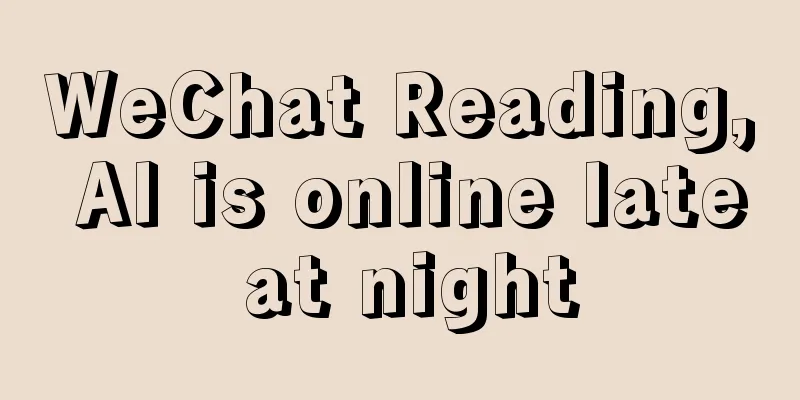WeChat Reading, AI is online late at night

Do you usually read e-books? I think most people are similar to me. When I see my peers or big names recommending a good book, I will quickly go to the platform I am familiar with to see if there is an electronic version. Once I find it, I will either download it or add it to my bookshelf and read it later. But let’s be honest, do we really have the time to finish a book? The probability is very small. Even if you find time to read, it will take a long time to finish a thick e-book. Moreover, the content in the book is not all useful information, and sometimes you have to spend time sifting through the information. So what should I do? I said that I used to use the search reading method. For example: Suppose I want to learn more about a question, such as "Consumer Uncertainty". First, I will write down the question, and when I have time, I will open my computer and enter the keywords in the search engine to see many related studies. However, I still want to know about the concept of consumer psychology, which top scholars have studied it before? Is there a consensus among scholars? Where can I find it? At this time, I would use WeChat Reading and enter "consumer psychology" in the search box. The system would then display multiple books that cover this topic and point out which chapters, paragraphs, and sentences mention it. This is Sodu. Sodu is very useful for people who do research. However, there is a problem with this: WeChat Reading still presents a lot of content, and it takes time to filter it. Is there a faster way to solve it? Of course. Yesterday, WeChat Reading was quietly updated and a new feature was introduced: AI Book Questions. 1. What is AI Questioning?To put it simply: WeChat Reading has added an AI search assistant that can find the answers you want in a large number of books; you just need to ask questions or enter search content, and it will automatically reply to you. A month ago, this feature was tested in grayscale. Some friends around me tried it and thought it was dead. Unexpectedly, it was launched in the past two days. It is not yet available on the PC version. If you want to experience it on your mobile phone, just update the WeChat Reading version to 8.2.0. How do you use WeChat Reading AI to ask questions about books? What is its use? Don't worry, I will explain them one by one. Remember two thoughts first:
For the former, first, open the WeChat Reading APP and find the book you want to read, such as "The Poor Charlie's Almanack". Then, click in to read. Next to the table of contents on the left, there is an AI outline. It will help you organize all the underlined and useful parts of the book based on the outline. I tested it and it's not perfect, but it's quite helpful for reading a book quickly. If you want to read a certain paragraph, just click to jump. When reading, if you encounter some different words or complex concepts, just long press the word or sentence, and the system will pop up a menu. You can select "AI Ask Book" in the menu, and AI will quickly give you a detailed analysis and explanation of the system. (1: Long press the word, the menu pops up and AI asks questions) I think this function is very similar to Feishu’s corporate encyclopedia and is quite practical. Did you know? In the past, when I encountered a term or concept I didn’t understand while reading, I would search on Baidu or Toutiao. I had to switch screens every time. Sometimes, during the search, I would see other interesting content and be easily distracted. Now, you can solve the problem directly in WeChat Reading. If you don’t understand something, just long press and search to get the answer. When I get the answer and want to understand a question more deeply, I just need to click on the link to jump directly to the specific content page of the relevant book, which makes it convenient for me to further explore and learn knowledge. It is much more convenient. This function kills three birds with one stone. First, it guarantees my flow moment; second, it gives accurate answers; third, it links other books in the ecosystem. This is book-driven. Simply put, it is centered around a book and uses AI to ask questions about the book. 2. So, how to do problem-driven approach?You must have understood the literal meaning, that is, to find answers with questions. After the update, the WeChat Reading APP does not have an "AI Ask Books" button by default. However, don't worry, you just need to ask questions in the usual search method. For example: I want to understand what the "Mirror Self Effect" means. I want to know its definition, development history, and which psychologists have proposed and discussed it. What should I do? I just need to open the search box and type in the keyword "Mirror Self Effect". A "AI Ask Book" button will appear on the right side of the page. Click it and all the information about the definition of the concept, its impact, limitations, etc. will be listed. (2: Enter keywords in the search box, and AI Question Book will appear in the menu bar) The best part is, the answers are not only accurate, but incredibly convenient. Isn’t it amazing? It can also automatically raise some questions to stimulate innovative thinking. These questions are generated by AI and can help me think and explore more deeply. The design of this function seems to be inspired by the "thematic reading" in "How to Read a Book", but it is implemented in a smarter way. It is not only limited to one book, but can quickly summarize the contents of all related books in WeChat Reading. When you encounter complex or diverse topics, you don’t have to flip through the books page by page to look them up yourself. AI Ask Book will do it for you and jump directly to the relevant chapters, making exploring topics easy and efficient. Therefore, any questions I encountered while reading can be answered immediately, which greatly improved my reading coherence and depth. This is the problem-driven approach. Using AI with questions is really helpful. Many people don’t know that WeChat Reading allows you to browse articles, and you only need to move the content you are interested in into or out of your bookshelf. There is another "bad idea": I tested it yesterday. I uploaded the files and favorite public accounts on my computer to WeChat Reading through the PC, and used AI to ask about books. It can also be done. This idea is a great combination. Imagine if I import all the articles about a certain type of research in batches and run AI on them, what results will I get? Isn't it amazing? Therefore, regardless of whether it is "book-driven" or "question-driven", it has three functions:
Master the core and use it with ease . Think about what it can bring to you and in what scenarios will you use it? When we get a new feature, there are always advantages and disadvantages. I think this disadvantage can be described in one word: flexible castrated version. You may ask, what does it mean? Why describe it like this? Flexible and castrated? Yes. On the one hand, when I search with questions, although AI Question can automatically recommend some light pipe questions to me, I cannot set these questions myself , which makes me feel that this function exists, but I cannot adjust it according to my needs, just like a part has been cut off. On the other hand, the ecosystem is both a factor in one’s success and failure. The content in WeChat Reading is copyright-aware. It can only search for recommended answers based on the words I choose. It naturally cannot provide answers that are not in WeChat Reading. for example: I typed in "What is Cunningham's Law?" and it said there were no answers. And the answers to more complex, abstract questions were not good enough. Therefore, there are certain limitations on content and search. Sometimes, the follow-up questions automatically generated by the system do not quite meet my needs. I believe that the technology will become more and more perfect, and the WeChat team will also work hard to improve it. While maintaining the functional advantages, it will add more personalized settings to make AI book questions more flexible and diverse. Although there are still some areas that need to be improved in AI Questioning, there is no doubt that it is a revolutionary new feature. Platforms like Get and Mita AI have already tried similar features, but WeChat can bring greater impact because of its massive content resources. It can definitely be described as small actions, big variables. Do you know what technology is used behind AI Question Book? It relies on a technology called "RAG" (Retrieval Enhanced Generation), which is part of Tencent's Hunyuan Assistant model. Sounds very high-tech, right? It's not difficult to understand.
There is a lot of information on the Internet, and RAG technology is like a super smart librarian. For example, it helps you filter out false information, outdated information, and content from non-authoritative sources, so that every piece of information you see is reliable. In addition, RAG has another benefit: traceability. It not only keeps the information current, but also directly links to the latest information sources. For example, when you want to know the latest research or news, it can provide it immediately, making the answer more convincing and practical. This technology makes language models not isolated. They can be closely integrated with the huge knowledge base to provide more accurate, fluent and rich answers, whether answering professional questions or completing professional writing tasks. This is a breakthrough in cognitive ability. To put it simply, imagine a person who used to study only by reading books. Now he can not only read books, but also search online and screen books. He can learn, search and digest at the same time. Isn't this a great cognitive upgrade? This is the breakthrough of RAG technology. Okay, I've said a bit too much. However, the "AI Ask Books" function of WeChat Reading is worth trying. In the AI era, it is more important to be able to ask questions than to be able to solve them. Asking questions can stimulate thinking, challenge existing cognition and viewpoints, and continuously improve thinking ability. In the process, we also exercise our skills in analyzing the nature of problems and exploring solutions to them. These skills may be the key to human progress and development. Author: Wang Zhiyuan Source public account: Wang Zhiyuan (ID: Z201440) |
<<: A brief history of CEO live streaming in China
Recommend
Xiaohongshu’s traffic rules have changed dramatically, and new rules for business notes have been launched
The traffic rules of Xiaohongshu platform have und...
How many orders can Lazada place in a day? How to identify Lazada orders?
Lazada is the largest e-commerce platform in South...
What does Amazon sales work involve? How much commission do you get?
Nowadays, cross-border e-commerce is very popular ...
Is it reliable to earn the difference on Amazon’s overseas purchases? Why?
Amazon, as a cross-border e-commerce platform, can...
How to register a wish account? Which two documents are required to register an account?
Wish is a global shopping platform that provides c...
Can Facebook sell products? Can it sell virtual products?
Facebook, also known as "Facebook", has ...
How to get started as a newbie at Lazada? Lazada operation ideas for newbies
Lazada is a newly emerging e-commerce platform in ...
Content e-commerce: Douyin, Kuaishou, and Xiaohongshu "part ways"
As content platforms move into the e-commerce fiel...
How often should Amazon listings be optimized? How long does it take to see results after optimization?
On the Amazon platform, optimizing listings is the...
How to quickly promote a product on Xiaohongshu! How to achieve 20 million+ sales through Xiaohongshu in less than a year?
Want to know how brands can successfully find a se...
Shopee official wallet supports US dollar payments in Vietnam
Shopee announced in early September that Shopee of...
What does an Alibaba International Station account manager do? What should operations do?
As we all know, Alibaba International Station has ...
What should a novice individual seller do on Amazon? Some experience sharing
As a new Amazon individual seller, you may face ma...
Weilai started to think about content when it started selling coffee
This article mainly discusses NIO’s strategy of in...
"47 million items, 3 billion yuan", single live broadcast sales exceeded 10 million yuan, this small county was changed by traffic
This small county has brought Hanfu into the publi...









